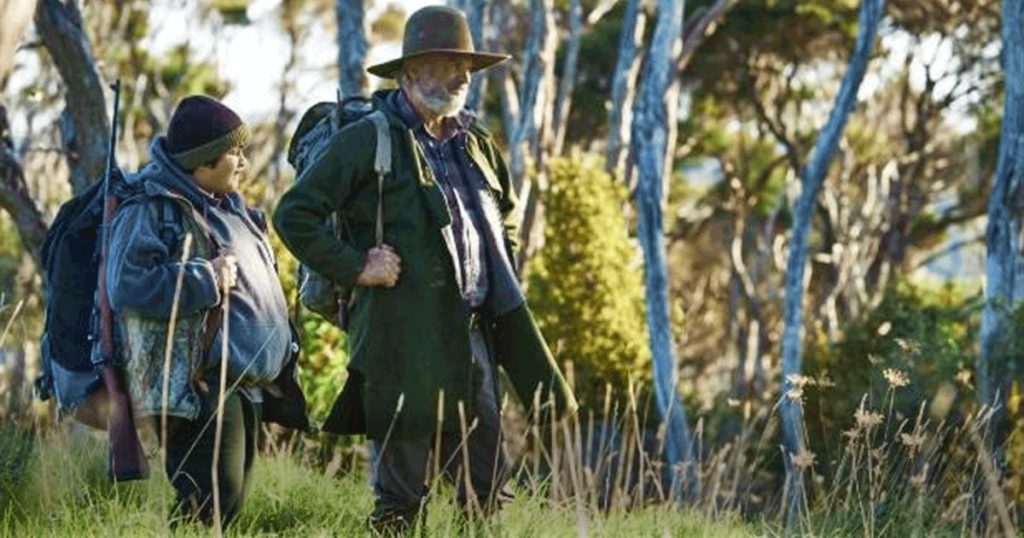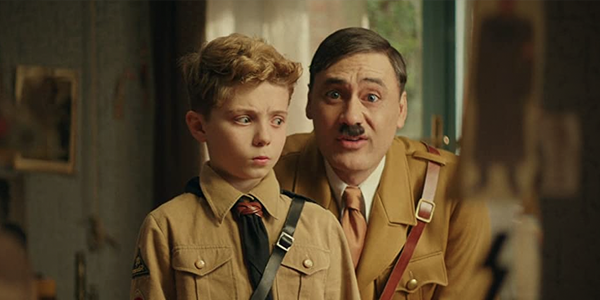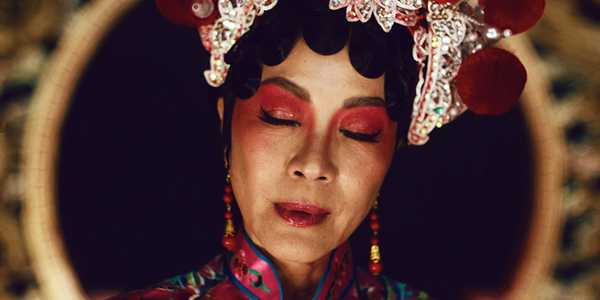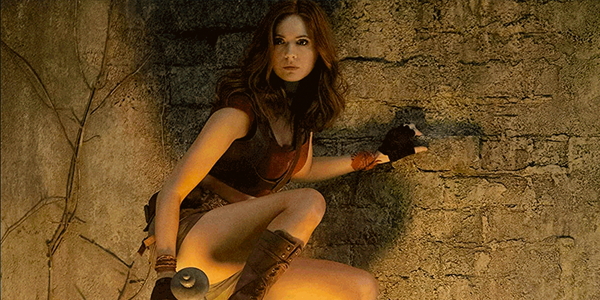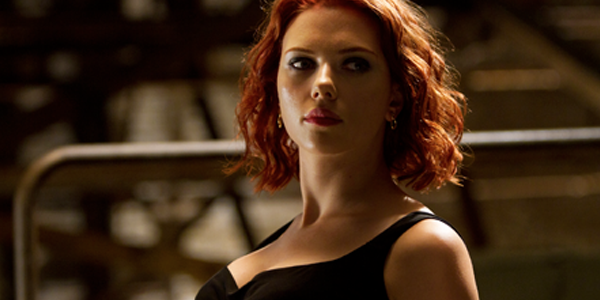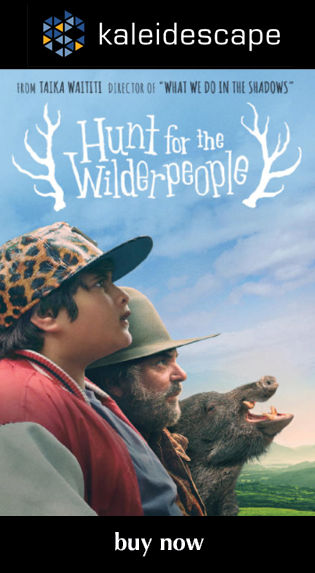ALSO ON CINELUXE
Sign up for our monthly newsletter
to stay up to date on Cineluxe
This entertaining early effort from quirky director Taika Waititi offers a glimpse of his blockbusters to come
by Dennis Burger
updated July 18, 2023
If you want to know how Taika Waititi—a quirky independent Kiwi filmmaker previously best known for making that mockumentary about vampires and a few episodes of that TV show about a musical-comedy duo—somehow came out of nowhere and landed a gig directing Thor movies, you’ll find some answers in 2016’s Hunt for the Wilderpeople. If you’re still trying to figure out how Waititi actually managed to make a good Thor movie, when directors as celebrated as Kenneth Branagh tried the same and failed spectacularly, again, I would point you in the direction of Hunt for the Wilderpeople.
Waititi has developed a reputation for absurdity, and this hilarious film about a troubled foster child and his reluctant guardian traipsing through the New Zealand bush on the run from the law is nothing if not absurd. But who cares, really? There are any number of filmmakers out there who specialize in the absurd, and you don’t see Hollywood throwing money at them to helm blockbusters.
What makes Waititi so sought after is that he also has a knack for something Hollywood couldn’t fake if you let an infinite number of studio monkeys tug at an infinite number of heartstrings for an infinite amount of time: Sincerity. And of all his films I’ve seen to date, Hunt for the Wilderpeople is his most sincere.
A moment early on illustrates this perfectly. Little Ricky Baker, an adolescent hooligan who has bounced around the foster-care system, is first introduced to his foster mother, Bella. Her excitement is palpable and she nearly trips all over herself with excitement, which of course causes her to say and do the stupidest things possible.
In almost any other filmmaker’s hands, Bella’s nervous awkwardness would have been played for laughs at her expense. She would have been a joke to be mocked, an out-of-touch wannabe-hip parental unit portrayed in the most clichéd way possible.
And the scene is played for laughs—but not at Bella’s expense. The humor comes from the situation itself, the relatability of it all. And that makes the character’s transformation from doting foster parent into bad-ass backwoods farmer chick all the more believable. It’s a shame we don’t get to spend more time with her, because she’s really the heart of the film. But her untimely death is the fire that fuels the entire rest of the plot, which is one of the most compelling comedies-of-errors I’ve seen in ages.
I’m not really spoiling the plot here because there’s not a ton to spoil, but with Bella out of the picture, Ricky is slated to be taken back into the foster system, and as a result he runs away. Bella’s husband, Hec—who professes to have no emotional investment in the boy—follows him, and before long they’re branded as fugitives and become the targets of a highly publicized manhunt.
And that’s the story. But I’m a sucker for a simple tale, especially one this well-told. It isn’t just Waititi’s lack of cynicism that makes it work, though. It’s also his gift for pacing and most especially timing. He also knows how to let kids be kids. Ricky, played by Julian Dennison (who would go on to have a memorable turn in Deadpool 2 as Firefist), doesn’t just act like a kid and talk like a kid—he thinks like a kid. It’s one of those rare performances that shines an unflinching light on just how awful and inauthentic most portrayals of adolescents in films are.
What’s more, Dennison and Sam Neill (Hec) don’t really act like they’re in a comedy. Some of the secondary characters do, hamming it up and overperforming—not egregiously degree, but certainly in keeping with the genre. The two leads, though, play it straight. They’re both weirdos, and there’s definitely a comedy-duo dynamic between then, with Dennison playing the goof and Neill the straight man. They’re hilarious but, again, they’re not playing it up for laughs.
Wilderpeople is thematically rich for a comedy. It’s hard to watch and not be reminded of Goethe’s famous quote: “If you treat an individual as he is, he will remain how he is. But if you treat him as if he were what he ought to be and could be, he will become what he ought to be and could be.” Wilderpeople takes that one step in the other direction and plays with notions of what happens when we assume people to be criminals. And while it’s not too terribly deep, it’s certainly more food for thought than you’ll get from most slapstick romps.
Another thing that makes Wilderpeople such a joy is that it’s not nearly as predictable as most comedies. About an hour into the 100-minute runtime, anyone who’s ever seen any movie ever will have written the ending in their heads. But Waititi doesn’t go for the obvious resolution, which makes the conclusion just a bit more satisfying and a lot more humorous, though no less sweet than the ending you’ll think is coming.
One word of warning: If you’re at all sensitive to animals being harmed, or if you have kids who are, there are a couple of scenes that are more difficult to watch than Old Yeller. I wish I’d known that ahead of time.
At any rate, given the relatively recent vintage of Hunt for the Wilderpeople, it’s a little surprising it’s not available in 4K HDR. Watching it in HD via Kaleidescape, it’s evident a handful of scenes would benefit from the enhanced resolution of UHD, especially some of the landscape shots. As for HDR, though? I’m not sure it would make a huge difference. Waititi and cinematographer Lachlan Milne obviously aimed for a somewhat muted look. Blacks are never fully black and at no point do any of the brighter areas of the image come close to clipping. That gives the film a pastel look, even when colors get a bit more vibrant. Given this, I can’t help but wonder if 10-bit color and dynamic range would significantly change the look of the imagery at all.
The real question is whether the limitations of HD are in any way distracting. And the answer is a resounding and enthusiastic “No!” The film is so visually striking that you rarely have time to worry about things like pixel count and color gamut. Every shot, no matter how seemingly mundane, is framed in such a way as to be utterly engaging. There’s nothing obtrusive about the camerawork, though, all of which is in service of the story.
I’ll admit, though, that the DTS-HD Master Audio 5.1 does get a little too clever for its own good. The mix leans a bit too heavy on the surround channels on occasion, especially in scenes where music is the predominant audio element. Ignoring those rare flubs, it’s a fantastic mix overall, full of aggressive front-soundstage panning that perfectly serves the onscreen action. Dialogue intelligibility is also topnotch, which is much appreciated given the thick Kiwi accents of most of the actors.
It’s a bit of a bummer that the Kaleidescape download lacks the supplemental material included with the Blu-ray release. (Kaleidescape isn’t alone, mind you. Vudu, Amazon, and other digital retailers also present Wilderpeople completely devoid of goodies since Apple seems to have the exclusive rights to the film’s extras in the digital domain.) I’m itching to listen to the commentary featuring Waitit, Neill, and Dennison, and I wouldn’t mind checking out the blooper reel, either.
Really, though, Hunt for the Wilderpeople stands on its own, and is very much worth the purchase price even without supplements.
Dennis Burger is an avid Star Wars scholar, Tolkien fanatic, and Corvette enthusiast who somehow also manages to find time for technological passions including high-end audio, home automation, and video gaming. He lives in the armpit of Alabama with his wife Bethany and their four-legged child Bruno, a 75-pound American Staffordshire Terrier who thinks he’s a Pomeranian.
PICTURE | That this is an HD instead of 4K HDR presentation is never distracting. The film is so visually striking that you rarely have time to worry about things like pixel count and color gamut.
SOUND | While overall fantastic, the DTS-HD Master Audio 5.1 does get a little too clever for its own good, leaning a bit too heavy on the surround channels on occasion, especially when music is in the foreground
© 2023 Cineluxe LLC


